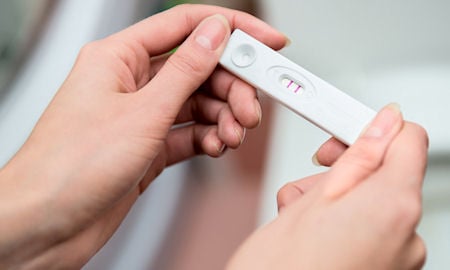
Ovarian Hyperstimulation Syndrome
The medications used to stimulate your ovaries may cause side effects. These side effects can range from mild to severe. Excessive stimulation of the ovaries is called ovarian hyperstimulation. This may require a hospital stay. Be aware of body changes and contact your program nurse if you have any questions or concerns. She will contact the physician if necessary. You will usually have symptoms of mild hyperstimulation during your treatment cycle. However, moderate and severe symptoms are less common and usually occur at lease several days after embryo transfer.
If your period starts, you will likely begin to feel better. Pregnancy may prolong or exacerbate these side effects. It may take up to 10 weeks for the symptoms to resolve. REMEMBER: The fact sheet is only a guide and not intended as a substitute for medical care.
“LOOK FOR HYPERSTIMULATION”
Ovarian hyperstimulation syndrome is associated with an exuberant ovarian response to HMG or FSH. This can occur rarely in patients ovulating spontaneously or in women taking clomiphene. In this condition, the ovaries enlarge suddenly, and fluid (called ascites) leaks into the abdominal cavity, with or without pain. Fluid may accumulate around the lungs (called pleural effusion). It is estimated that severe hyperstimulation syndrome will occur in 0.4% to 2.0% of women taking these medications.
When moderate to severe hyperstimulation occurs, a number of problems within the body may follow. Urine output may decrease as fluid is transferred into the abdominal cavity and kidney function may be impaired. When this occurs, admission to the hospital is required to treat your fluid balance and maintain an adequate urine output. In addition, this dehydration can lead to blood clots to the lungs or other organs which may be life threatening.
To monitor your status and to detect early severe hyperstimulation syndrome, we ask that you do the following:
- Measure your weight (no shoes and use the same scale) at the same time each day beginning after your hCG shot.
- Call us if:
- your weight increases by two pounds
- your urine output seems to decrease or you seem excessively thirsty
- your abdomen seems to enlarge or to be bloated
- if you have vomiting, diarrhea, or increasing abdominal pain
- if you have further questions
Please Note: For high-risk patients undergoing IVF it may not be advisable to transfer embryos in a cycle. Because of the concern for possible OHSS, it may be necessary to avoid pregnancy at this time. All embryos would be frozen and transferred during a subsequent cycle. The physicians will assess the situation with the couple before an embryo transfer is scheduled.
Use the following chart to record your measurements daily

